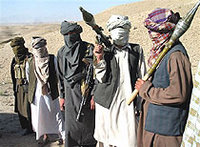The Taliban is running out of money. That was the conclusion some observers reached when the U.N. Office on Drugs and Crime reported last week that Afghanistan's poppy crop is down nearly a quarter compared to last year. But other experts caution against declaring financial victory. If anything, the behind-the-scenes campaigns to dry up Taliban funding are only now catching up to the extremist group's sophisticated financial operations.
Poppies, the basic ingredient in opium, represent Afghanistan's biggest export -- albeit an illegal one. They "fund the activities of criminals, insurgents and terrorists in Afghanistan and elsewhere," according to the UNODC report. Last year's crop in Afghanistan was valued at more than $3 billion, the report asserted, before adding that this year's spring crop was 22 percent smaller, thanks in part to military-supported eradication efforts.
"At a time of pessimism about the situation in Afghanistan, these results are a welcome piece of good news and demonstrate that progress is possible," the report quoted UNODC Executive Director Antonio Maria Costa as saying. "Bankrupting the Taliban" through counternarotics operations "provides new opportunities for success in Afghanistan," Oliver North wrote in The Washington Times on Sunday.

